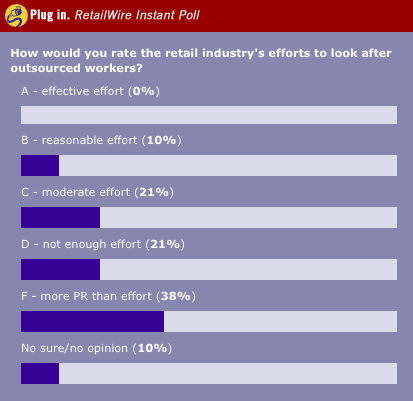RetailWire Instant Poll Results:

RetailWire BrainTrust Comments:
The "on-the-shelf" expectancy of product quality at a low accessible price would seem to register higher with a great many American consumers than the out-of-sight welfare of workers producing the products. Thus, retailers find themselves in a dilemma: either go with marketing's flow and try to get prices that appeal to today's consumer needs and desires or spend a portion of their time monitoring working practices in overseas cultures which may have different standards and values. Sounds a little like a Catch 22, doesn't it?
Gene Hoffman, President, Corporate Strategies International
| Gene Hoffman, President, Corporate Strategies International, Says: |
 The "on-the-shelf" expectancy of product quality at a low accessible price would seem to register higher with a great many American consumers than the out-of-sight welfare of workers producing the products. The "on-the-shelf" expectancy of product quality at a low accessible price would seem to register higher with a great many American consumers than the out-of-sight welfare of workers producing the products.

Click Here to See Reader Feedback |
Many overseas inspections by American retailers' agents are done using the script from the movie Stalag 17. The inspectors inform the factories (prison camps in the movie) well in advance of their expected arrival date. On the date they arrive, all is well. The workers (prisoners in the movie) do not complain.
Hard to determine the provenance of every item in the supply chain? Tell that to kosher inspection organizations. They operate in every country on Earth, and have to document the source of every ingredient as well as its transportation and packaging, every step of the way.
Can't tell if the workers are being treated humanely? Can't tell if unconscionable child labor is being used? Install a few surveillance cameras connected to the internet at every factory. Don't tell the factory when you'll be watching and recording.
Mark Lilien, Consultant, Retail Technology Group
I run a sourcing and supply management company in Asia and spend a lot time sourcing and auditing in India for our western clients. I am western and we have western ethics and processes - random auditing, to name a significant one. In the last 2 years I audited 100+ suppliers in India. Child labour, pollution, no health and safety, no accident insurance, paying staff below the minimum wage - all found. We do not find forced work very often. We work to improve suppliers to western expectations or we do not trade with them.
However, to raise consciousness, much of the 1bn + population lives in poverty. In many families children are the breadwinners. The next best alternatives to work are not great; begging, having a hand cut off for greater returns or prostitution. Or collecting and selling cow dung in towns with no gas or electricity.
Ineffective government and corruption is a key factor and this has held back investment and subsequently trade. Profit expectations of big companies in the West and low quality B2C sales and only competing on price are others.
And we will still find child labour in India until the next best alternatives for them improve. Trade will make that happen.
Steve Bramhall, Managing Director, SB Purchasing
Read the entire story and RetailWire discussion at:
http://www.retailwire.com/Discussions/Sngl_Discussion.cfm/13046
Get Plugged in with RetailWire.
Membership in RetailWire.com is free to all retail and related industry professionals. Simply go to www.retailwire.com and click the FREE REGISTRATION button.
|